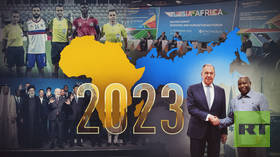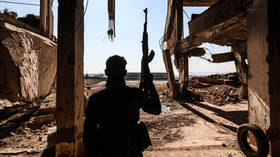Lavrov embarks on African tour
Russian Foreign Minister Sergey Lavrov has begun a tour of Africa as Moscow seeks to strengthen relations with countries on the continent, despite widespread Western opposition to its presence.
After arriving in the Republic of Congo late on Monday, Lavrov was due to sign an international agreement with the country’s leadership on Tuesday in the city of Oyo, over 400km from the capital, Brazzaville, Russian Foreign Ministry Spokeswoman Maria Zakharova announced on her Telegram channel.
Earlier on Monday, Lavrov visited Guinea and was welcomed by the West African nation’s transitional president, Mamadi Doumbouya, in the capital, Conakry.
While in Conakry, the top Russian diplomat met with his Guinean counterpart, Morissada Kouyate, to discuss a variety of issues, including deepening political dialogue and expanding foreign policy coordination on global concerns at the UN, Moscow’s Foreign Ministry said in a press release.
According to the ministry, the two countries have agreed to collaborate on projects involving geological research, the development of mineral deposits, and health.
Russia’s relations with African countries, particularly Mali, Burkina Faso, and Niger – all former French colonies that have severed security ties with France – have been a source of concern for the US and its European Union allies.
The EU said earlier this year that it faced a dilemma over its remaining presence in the Sahel region, where the union claimed Moscow’s influence has increased.
In March, Niger’s military government terminated a defense agreement with Washington that had been in force since 2012. The landlocked state’s leadership accused the US of threatening sanctions and attempting to dictate who Niamey’s partners should be.
During talks in Conakry on Monday, Lavrov and Kouyate confirmed Russia and Guinea’s “rejection of a rules-based order imposed by the West, as well as colonial practices in relations with sovereign states,” according to the Foreign Ministry.
The senior Russian official has paid working visits to Africa several times in the last year, including South Africa in January, Kenya in May, Mozambique in June, and Morocco and Tunisia in December.
Moscow committed to improving mutually beneficial relations with African governments in a variety of sectors, such as defense cooperation and food security, at the Russia-Africa Summit in St. Petersburg last summer.
In February, Russia delivered humanitarian wheat to six African countries, fulfilling its pledge to help food-insecure states fight hunger.
On Monday, Lavrov invited the head of Guinea’s diplomacy to a ministerial conference at the Russia-Africa Partnership Forum scheduled for November in Sochi. It aims to take stock and give additional impetus to the implementation of the agreements reached during the second Russia-Africa Summit last July, according to the ministry’s statement.













